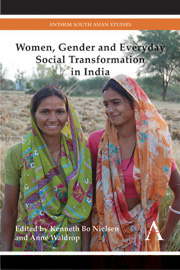Book contents
- Frontmatter
- Contents
- Acknowledgments
- Women and Gender in a Changing India
- PART I WORK, TECHNOLOGY, ASPIRATIONS
- Chapter One Today's ‘Good Girl’: the Women Behind India's BPO Industry
- Chapter Two Gender, Intersectionality and Smartphones in Rural West Bengal
- Chapter Three The Introduction of Electricity in the Sundarban Islands: Conserving or Transforming Gender Relations?
- Chapter Four Changing Consumption and the Negotiation of Gender Roles in Kerala
- Chapter Five Gender, Work and Social Change: Return Migration to Kerala
- Chapter Six Showtime and Exposures in New India: the Revelations of Lucky Farmhouse
- PART II DEMOCRACY AND THE DEVELOPMENTAL STATE
- PART III ASSERTIONS AND ACTIVISM
- About the Editors and Contributors
Chapter Five - Gender, Work and Social Change: Return Migration to Kerala
from PART I - WORK, TECHNOLOGY, ASPIRATIONS
Published online by Cambridge University Press: 05 October 2014
- Frontmatter
- Contents
- Acknowledgments
- Women and Gender in a Changing India
- PART I WORK, TECHNOLOGY, ASPIRATIONS
- Chapter One Today's ‘Good Girl’: the Women Behind India's BPO Industry
- Chapter Two Gender, Intersectionality and Smartphones in Rural West Bengal
- Chapter Three The Introduction of Electricity in the Sundarban Islands: Conserving or Transforming Gender Relations?
- Chapter Four Changing Consumption and the Negotiation of Gender Roles in Kerala
- Chapter Five Gender, Work and Social Change: Return Migration to Kerala
- Chapter Six Showtime and Exposures in New India: the Revelations of Lucky Farmhouse
- PART II DEMOCRACY AND THE DEVELOPMENTAL STATE
- PART III ASSERTIONS AND ACTIVISM
- About the Editors and Contributors
Summary
Recent debates on migration and development point out that labour migration can be a key driver of economic and human development and thereby social change (Goldin et al. 2011). The question of how international migrants can contribute to the development of their home countries is highly relevant to Kerala in South India, where remittances contribute about 28 per cent of the state domestic product (Kurien 2002). Undoubtedly, the remittances sent home by migrant workers are important, but how is migration reshaping the everyday lives of their families? Here I will look into women's and men's return migration from the Persian Gulf to Kerala and explore the effects on work and gender relations within their households. I will analyse this by focusing on how the migrants' return home affects women's agency. How does men's return migration have an impact upon women's control of their own lives? And how does women's return migration affect their agency?
For more than a decade several surveys on migration from Kerala to the Gulf have been conducted by researchers at the Centre for Development Studies in Thiruvananthapuram (Zachariah and Rajan 2012). Most of these surveys have focused on economic aspects of migration. However, recently, the India Migration Reports have contained articles on the social aspects of migration in Kerala. These include, for example, Rajan and Nair's (2013) work on children ‘left behind’, and Zachariah and Rajan's (2013) study of the impacts of migration on the elderly.
- Type
- Chapter
- Information
- Women, Gender and Everyday Social Transformation in IndiaA Revisionary History, pp. 75 - 88Publisher: Anthem PressPrint publication year: 2014



